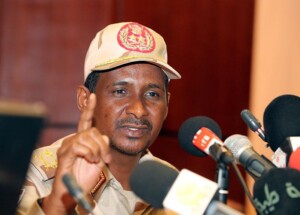Sudan grassroots forces prioritise social justice in political proposal
On January 15, the resistance committees in Wad Madani, capital of El Gezira, published a joint position paper about their demands of a democratic Sudan. Journalist and political analyst Hussein Saad read the document and presented the contents to Radio Dabanga yesterday.
 Position paper of the Wad Madani Resistance Committees on the transitional period (Social media)
Position paper of the Wad Madani Resistance Committees on the transitional period (Social media)
On January 15, the resistance committees in Wad Madani, capital of El Gezira, published a joint position paper about their demands of a democratic Sudan. Journalist and political analyst Hussein Saad read the document and presented the contents to Radio Dabanga yesterday.
The resistance committees of Wad Madani have presented a political proposal about how “to start a radical and broad political process aimed at reaching a unified national political vision on the nature of the state, governance, the economy and the transfer of power,” he states. The document was developed, “through national consultation processes organised by the resistance committees and elected trade unions”.
According to Saad, only the resistance committees which are working on grassroots level* are able to constitute “a turning point” in the current political impasse and economic crisis. He lauds “their courage” in organising protest marches “despite the excessive violence used to suppress them, while at the same time being involved in drawing up a political charter for the future”.
He further points to the social dimension of the members of the resistance committees, “a unique feature”. They organise support for families of killed, wounded, missing and detained protesters. “They also use smart approaches to ward off the cunning attempts to drag them into violent behaviour. They for instance formed a peaceful human wall in Omdurman to receiving a demonstration from Khartoum North earlier this month.”
The Wad Madani proposal was launched on social media. A press conference on the contents scheduled for last Saturday had to be cancelled because of mass demonstrations in the city following the killing of a protester that day. Saad said that the Khartoum Resistance Committees are also working on a political document, but that their partners in Wad Madani preceded them.
Grassroots level
The Wad Madani resistance committees state that the transitional period to democracy will start with “the fall of the totalitarian regime, based on the alliance of Al Bashir’s security apparatus, militias, and rebel movements, followed the drafting of a transitional constitution by a transitional legislative council”.
They see a large role for the countryside. The governance system in the transitional period “is to be based on a decentralisation whereby constitutionally established local governments will pave the way for general elections”.
A local government system should allow the people in the countryside “to make the most of its resources for local development, in accordance with national revolutionary development projects that meet the aspirations of the Sudanese countryside”.
Peace must be realised on grassroots level as well, by reconciliation meetings (“stakeholder conferences”). Displaced people living in conflict areas must be able to decide if they want to return to their places of origin or prefer to stay in the camp areas.
The document further dismisses the native administration system, introduced by the British colonial authorities in the first quarter of the last century, calling it “a remnant of the colonial system of decentralised control in which the local population is divided on ethnic bases and ruled indirectly by local tribal leaders, and based on a different legal and administrative system than those in the urban areas”.
Social justice
The general objectives of the transitional period are “to agree on the pillars and foundations of a comprehensive national development project. This will form the basis for a permanent democratic national constitution that will establish a civil, democratic state in which social justice is achieved”.
The Wad Madani grassroots committees stress that social justice includes “an equal distribution of resources among all the different social components” and forms “one of the pillars of the national development project”. It is “a fundamental issue that overlaps the other issues discussed in this declaration”.
On national level, a newly formed transitional legislative council is “to organise and supervise the processes of a popular referendum on a permanent constitution”.
The judicial system, “in its current form a broken system that is incapable of achieving justice”, must be re-established to ensure the independence of the judiciary “which should not be subjected to any ideological or political influence”.
The country’s resources are to be permanently controlled on corruptive practices inherited from the Al Bashir regime (1989-2019) and the regime’s empowerment** policies have to be fully undone. The right to work has to be guaranteed for all Sudanese as well.
Government spending
Apart from the urgent need to restructure the economic system in the country, “according to what is agreed upon in the transitional constitution and later the permanent constitution, the activists want government spending to prioritise basic services for health, education and infrastructure, which should be accessible to all Sudanese.
Spending on the administrative apparatus and the number of ministries should be reduced. The resistance committees suggest ministries for Health or Environment, Public and Higher Education, Irrigation, Agriculture and Livestock, Justice, Defence, Foreign Affairs and National Sovereignty, Interior Affairs, Finance and Resources, Local Governance, and Transparency, Accountability and Performance Monitoring.
A number of independent commissions are to be established “to avoid failures of the executive power in resolving the core issues during the transitional period, that may happen due to the weight and complexity of the tasks of the period, such as the files of peace, justice, and government agencies.”
The commissions mentioned a Transitional Justice Commission, a Civil Service Reform Commission, a Commission for the development of the Constitution, a Commission for the Restructuring of the Regular Forces, an Electoral Commission, and a Commission for Dismantling the Remnants of the Al Bashir Regime.
Hussein Saad ends his comments by saying that he fully agrees with the idea of the Wad Madani activists who state that “Full restoration of the national sovereignty forms the first step toward democratic transformation and equitable development”, because the 2018 December uprising “is not only a revolution against Al Bashir regime and its security apparatus, but a revolution of national liberation that returns freedom of decision-making, and political and economic independence to the Sudanese men and women.”
* Background information on development of the resistance committees, active in most of the neighbourhoods of the cities and towns in Sudan can be found in The role of local resistance committees in Sudan's transitional period, written by Prof Atta El Battahani and published by the Christian Michelsen Institute in 2021.
** Empowerment (tamkin) is the term with which the Al Bashir regime (1989-2019) supported its affiliates by granting them far-going privileges, including government functions, the setting-up of various companies, and tax exemptions.











 and then
and then